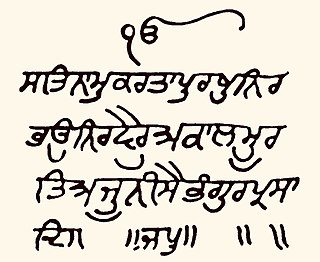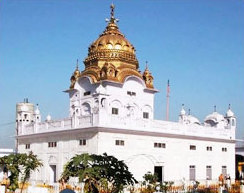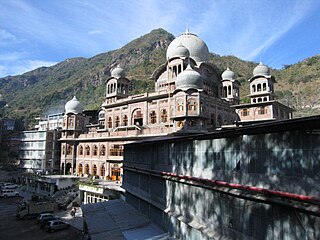
Guru Angad was the second of the ten Sikh gurus of Sikhism. Born in Hindu family and after meeting Guru Nanak, the founder of Sikhism, becoming a Sikh, and serving and working with Guru Nanak for many years, Guru Nanak gave Lehna the name Angad, and chose Angad as the second Sikh Guru.

The Mūl Mantar is the opening verse of the Sikh scripture, the Guru Granth Sahib. It consists of twelve words in the Punjabi language, written in Gurmukhi script, and are the most widely known among the Sikhs. They summarize the essential teaching of Guru Nanak. The Mul Mantar is a succinct doctrinal statement of Sikhism.

Batala is the eighth largest city in the state of Punjab, India in terms of population after Ludhiana, Amritsar, Jalandhar, Patiala, Bathinda, Mohali and Hoshiarpur. Batala ranks as the second-oldest city after Bathinda. It is a municipal corporation in Gurdaspur district in the Majha region of the state of Punjab, India. It is located about 32 km from Gurdaspur, the headquarters of the district. It is also a Police District. Batala holds the status of the most populated town of the district with 31% of the total population of district. It is the biggest industrial town in the district. Batala is the centre of the Majha region of Punjab.

Guru Nanak Dev Ji Gurpurab, also known as Guru Nanak's Prakash Utsav and Guru Nanak Dev Ji Jayanti, celebrates the birth of the first Sikh guru, Guru Nanak. One of the most celebrated Sikh gurus and the founder of Sikhism, Guru Nanak Dev is highly revered by the Sikh community. This is one of the most sacred festivals in Sikhism, or Sikhi.
Sangat is a Sikh term with its origin in the Sanskrit word sangh, which means company, fellowship and association. In Sikh vocabulary, the word has a special connotation. It stands for the body of men and women who meet religiously, especially in the presence of the Guru Granth Sahib. It is sometimes analogous to Sat-Sangat and Sadh-Sangat. The word sangat has been in use since the time of Guru Nanak (1469-1539). In his days and those of his nine successors, sangat referred to the Sikh brotherhood established in or belonging to a particular locality. In Sikhism there is a strong push for one to be a part of the Sangat as well as to avoid Ku-Sangat. Alongside Sangat is also the tradition of Pangat.
The principles of Sikhism state that women have the same souls as men and thus possess an equal right to cultivate their spirituality with equal chances of achieving salvation. While technically woman can participate in all religious, cultural, social, and secular activities including lead religious congregations, take part in the Akhand Path, perform Kirtan, and work as a Granthis, although equality for women has always been a major attribute of Sikhism and a great number of women have made significant contributions, it is important to note that it is still a work in progress.

Dera Baba Nanak is a town and a Municipal council in Gurdaspur district in the state of Punjab, India. Recently in November 2019, a corridor between India and Pakistan has been established at its shrine.

Sultanpur Lodhi is a city and a Municipal Council in the Kapurthala district in the Indian state of Punjab. The town is named after its founder, Sultan Khan Lodhi, who was a general of Mahmud of Ghazni in 1103 AD, and has also been mentioned in the Ain-e-Akbari. Sultanpur Lodhi is located on the south bank of a seasonal rivulet called Kali Bein, which runs 6 miles (9.7 km) north of the intersection of Beas and Sutlej Rivers, two of the Five Rivers of Punjab. The word Punj - ab, literally means five river - land.

Kartika, Karthika or Kartik or Kartika maasam is a month in Hindu calendar, that typically overlaps October and November. In the Bengali, Maithili, and Nepali calendar, it is the 7th month, in the Tamil calendar it is the 8th month.

Delhi Sikh Gurdwara Management Committee or DSGMC is an autonomous organisation which manages Gurudwaras in Delhi state. DSGMC also manages various educational institutions, hospitals, old age homes, libraries and other charitable institutions in Delhi. It is headquartered in Gurdwara Rakab Ganj Sahib, near Parliament House. In 1971, the Government of India entrusted the management, through an ordinance, to a five-member Gurdwara Board. The ordinance was replaced by the Delhi Sikh Gurdwaras Act, 1971, passed by Parliament, providing for a committee to be elected by Sikh vote. Elections took place under the supervision of government authority and the new body called Delhi Sikh Gurdwaras Management Committee (DSGMC) came into existence in 1974. Under the provisions of the Act, the elections must take place every four years.
The permanent arrival of Sikhism in England is dated to 1850 A.D. with the arrival of Maharajah Duleep Singh. The first Sikh place of worship, called a Gurdwara, was opened in 1911 in London and this was partly funded by the Maharaja of Patiala.

Baru Sahib also known as the "Valley of Divine Peace" is located in Himachal Pradesh, India.

Guru Nanak, also referred to as Baba Nanak, was the founder of Sikhism and is the first of the ten Sikh Gurus. His birth is celebrated worldwide as Guru Nanak Gurpurab on Katak Pooranmashi, i.e. October–November.
Guru Nanak Academy is an English Medium co-educational school managed by Guru Nanak Sewa Society in the Fatehabad district of the Haryana state of India. Subjects taught include English, science, commerce, Hindi, and Punjabi as professional courses in addition to music, mathematics, social studies, arts, physical education, and computer sciences as general courses.
Guru Nanak Sikh Academy is a mixed Sikh all-through school and sixth form. It is located in the Hayes area of the London Borough of Hillingdon, England. The school is named after Guru Nanak, the founder of the religion of Sikhism and the first of the ten Sikh Gurus.
Neapalese Sikhs first entered Nepal in the 18th century. Today, there is a small community of Sikhs living in Nepal, totaling around 7,000 people according to the 2011 census.
Varanasi, also known as Kashi, is considered as the religious capital of Hinduism. In the Hindu faith, it is the holiest of all of its cities; the four dhams in the four cardinal directions of the country – Badrinath in the north, Puri in the east, Dwarka in the west and Rameshwaram in the south – are all represented in the city in "archetypal forms" as the presiding deities at Badrinath Ghat, Assi's Jagannath Temple area, Shankudhara Pokhra, and Mir Ghat respectively. Other Hindu holy places, such as the Kedarnath at Kedar Ghat, Mathura at Bakaruia Kund or Nakhi Ghat, Prayagraj (Allahadbad) at Dashahvamedha Ghat, Kamakhya (Assam) at Kamachha, Kurukshetra at Kurkukshetra Kund near Asi, and Lake Manasarovar at Mansarovar near Shyameshvara are a part of the city's religious and cultural heritage.

Nirmala is a Sikh tradition of ascetics. According to the traditional beliefs, the Nirmala Sikh tradition was founded by Guru Gobind Singh in late 17th century when he sent five Sikhs to Varanasi to learn Sanskrit and Hindu religious texts.
Gurdip Singh Randhawa was an Indian academic who served as Vice-Chancellor of Guru Nanak Dev University, Amritsar and as Principal of Sri Guru Tegh Bahadur Khalsa College, Delhi. He received Padma Bhushan, the third-highest civilian award of India, in 2009 in science and engineering.











